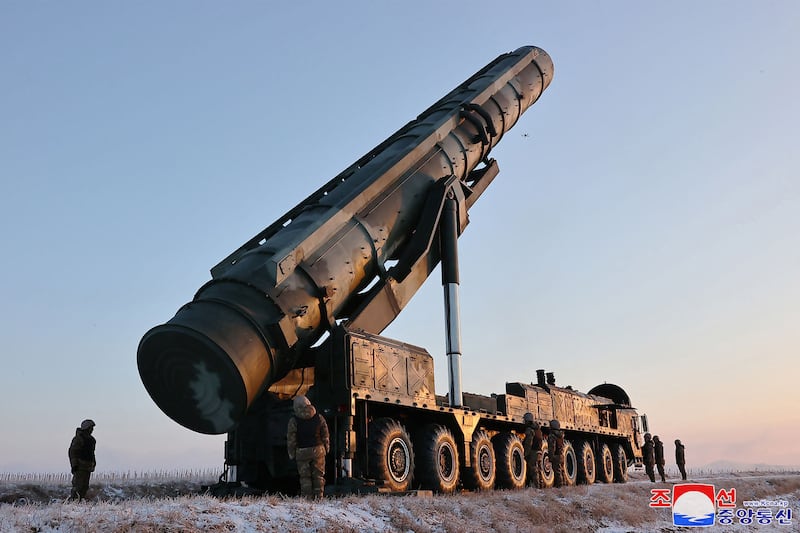Updated Oct. 31, 2024, 12:47 p.m. ET.
North Korea test fired what it said was a new intercontinental ballistic missile, or ICBM, on Thursday in a demonstration of what its leader said was its will to “counteract” against rivals and its determination to bolster its nuclear forces.
North Korea’s first test of an ICBM since December came amid rising global alarm about its deployment of thousands of troops to Russia to help with its war in Ukraine, which South Korea and its allies have warned risks triggering a dangerous escalation of the conflict.
South Korea, Japan and the United States condemned the test, North Korea’s latest violation of U.N. Security Council resolutions aimed at curbing its development of nuclear weapons and the missiles to carry them around the world.
The ICBM was fired at a “lofted trajectory” at 7.10 a.m. (6.10 p.m. ET on Wednesday) from near the North Korean capital, Pyongyang, and flew for up to 87 minutes, the longest ever flight by a North Korean ICBM, the South Korean and Japanese militaries said.
The missile reached a record altitude of over 7,000 kilometers (4,350 miles) and flew about 1,000 km (621 miles) before splashing down in the sea off northwest Japan, they said.
“The test-fire is an appropriate military action that fully meets the purpose of informing the rivals, who have intentionally escalated the regional situation and posed a threat to the security of our Republic recently, of our counteraction will,” North Korean leader Kim Jong Un said, according to South Korea’s Yonhap News Agency, which cited a statement carried by the North’s official Korean Central News Agency.
“I affirm that the DPRK will never change its line of bolstering up its nuclear forces,” he said, referring to his country by the initials of its official name, Democratic People’s Republic of Korea.
South Korea’s military warned on Wednesday that North Korea had completed preparations to test an ICBM, with a launch possibly timed to coincide with the Nov. 5 U.S. presidential election.

South Korea will impose new sanctions on North Korea in response to the launch, the Yonhap News Agency cited the presidential office as saying after an emergency meeting of the National Security Council.
The test came hours after South Korean and U.S. defense chiefs, at their annual meeting at the Pentagon, criticized North Korea for its deployment of what the allies have said are up to 11,000 troops to Russia in recent days.
“Amid a heightened readiness posture, our military maintains full readiness as we closely share North Korean ballistic information with U.S. and Japanese authorities,” Yonhap quoted South Korea’s Joint Chiefs of Staff, or JCS, as saying.
Last December, North Korea test fired its latest solid-fueled ICBM, the Hwasong-18.
‘Flagrant violation’
Japan said the launch was unacceptable.
“North Korea’s development of missiles and nuclear weapons threaten the peace and safety of our nation and the international community, so they are totally unacceptable,” Japanese Defense Minister Gen Nakatani told the media.
Japan’s Kyodo news agency earlier said Nakatani told reporters Tokyo would work closely with Washington and Seoul to gather information on the launch.
U.S. National Security Council spokesperson Sean Savett called the launch “a flagrant violation” of multiple U.N. Security Council resolutions that “needlessly raises tensions and risks destabilizing the security situation in the region,” the AP reported.
Savett said the U.S. will take all necessary measures to ensure the security of the American homeland and its South Korean and Japanese allies.
China, which has long been North Korea’s closest ally, said it was concerned about the latest developments on the Korean peninsula.
A foreign ministry spokesperson said China “has consistently maintained that preserving peace and stability on the peninsula and promoting the process of political resolution to the peninsula issue aligns with the common interests of all parties.”
South Korea’s military also warned on Wednesday that the North had completed preparations to test a nuclear device, possibly around the time of the U.S. election.
North Korea has conducted six nuclear tests since 2006, all of them underground at the Punggye-ri site. Its last nuclear test was in 2017.
Updated with comment from China’s foreign ministry.
Edited by Mike Firn.
